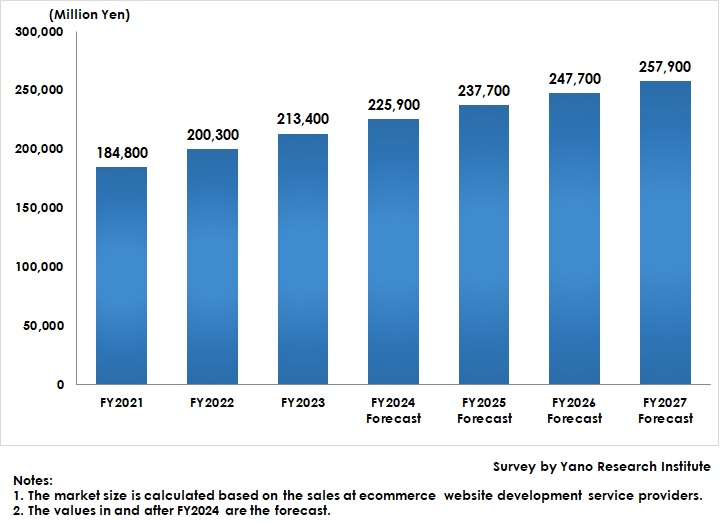No.3612
Ecommerce Website Development Service Market in Japan: Key Research Findings 2024
Domestic Ecommerce Website Development Service Market Size for FY2023 Estimated at 213,400 Million Yen, Up 6.5% on YoY
Yano Research Institute (the President, Takashi Mizukoshi) has surveyed the market of domestic ecommerce website development services and found out the market overview, market by service form, AI technology applications, and trend by service provider.

Market Overview
Affected by behavioral restrictions in the COVID-19 crisis from FY2020 to FY2021, those businesses in distribution & retailing or food manufacturing that had operated their business through physical stores (offline stores) have raised their investments in ecommerce entry or in existing ecommerce business and has enhanced their business by propelling digital transformation. This has increased demand for ecommerce website development services and has fueled robust growth in sales performance at providers of the services.
Although consumers have returned to physical stores after relaxation of behavioral restrictions in FY2022, demand for ecommerce has kept on growing, as purchasing via online has become the norm. By FY2023 the growth rate of the said market has somewhat settled down, because new entry has slowed down. Still, replacing of existing service form to a higher grade has been popular by ecommerce companies that have successfully expanded the business scale.
Subsequently, the estimated market size of ecommerce website development services for FY2023 has reached 213,400 million yen, 106.5% of that of the preceding fiscal year.
Noteworthy Topics
AI Powered Ecommerce Website Development Service Market
Most of leading providers of ecommerce website development services seem to be under development of and are using various AI technologies. Those providers that offer original AI or co-developed AI-related functions with a partner company are increasing, contributing to their clients (ecommerce businesses). In some cases, AI technologies are used for inhouse work efficiency.
The service segments that AI technology is most applied to are, first, automatic product description (sentence generation for product descriptions, automatic posting to social media, search engine optimization measures, etc.) Because of personnel shortage at client companies, the product description tool helps alleviate the burden at clients by letting them easily create sentences for product descriptions no matter how low the IT literacy of the tool user may be. Furthermore, AI can learn the brand image and style at client companies, enabling to suggest and produce the brand original creativities.
The second service segment that is well-supported by AI is customer support and website hosting. Responding to customer inquiries is a stressful challenge for a client company that hosts an ecommerce website. An AI chatbot facilitates it by automatically responding to consumer inquires, which helps improve work efficiency for client company employees. Client companies are provided with optimized frequently asked questions by each of websites and with responses that AI recommends. To be specific, all work processes such as shipping fee settings, inventory tracking, etc. receive swift support and distinct directions.
The third AI-supported service segment is highly accurate product recommendations. Products that are highly likely wanted by a specific customer are detected and recommended according to his/her attribute and behavioral logs at the website, which improves the conversion rate.
Other services that AI can be involved in are detection of fraudulent use of a credit card in security related features, automation of product information processing (information collecting, item settings, and processing), conversational commerce through generative AI (searching and ordering of desired products by interacting with AI), instant generation and delivering of highly attractive email sentences to consumers with convincing titles, and optimization of inventory management through accurate demand forecasts, etc. Thus, there are various AI-powered solutions provided, researched and developed.
Future Outlook
The rate of ecommerce sales in Japan is still lower than other countries. Therefore, there is still room for the ecommerce market to increase furthermore through market entries by a growing number of companies, which is projected to expand the market of ecommerce website development services.
The market expansion is likely also from enlargement of the ecommerce B2B segment and possibility of ecommerce channel development by new businesses with its new brand launched. As for the B2C segment, renovation of existing ecommerce websites is estimated to increase. CAGR of the domestic ecommerce website development market from FY2023 to FY2027 is projected to be 4.9%, with the market size for FY2027 reaching 257,900 million yen.
Research Outline
2.Research Object: Ecommerce website development service providers
3.Research Methogology: Face-to-face interviews (including online) by expert researchers, questionnaire survey, and literature research
Ecommerce Website Development Service Market
The ecommerce website development service is a series of services for ecommerce business, covering all the activities from business planning to system planning, designing, developing, and hosting a website for ecommerce business.
In this research, the ecommerce website development services include packaged services, cloud services (SaaS, ASP, etc.), and build-from-scratch (custom) services. The market size is calculated based on the sales at service providers.
<Products and Services in the Market>
Packaged services, cloud services, build-from-scratch (custom development) services
Published Report
Contact Us
The copyright and all other rights pertaining to this report belong to Yano Research Institute.
Please contact our PR team when quoting the report contents for the purpose other than media coverage.
Depending on the purpose of using our report, we may ask you to present your sentences for confirmation beforehand.